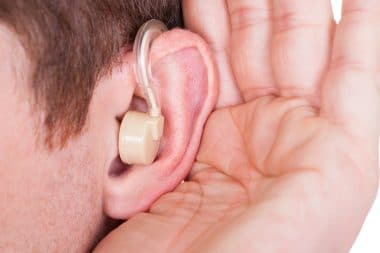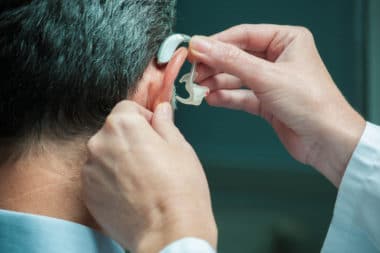It’s called otitis externa, but you probably know it more clearly as swimmer’s ear. It’s an ear infection that causes pain in the outer ear canal, and it affects anyone from children to adults. It’s not always swimming that brings on a case of swimmer’s ear. It’s caused by any water left in the ear following an introduction to water, and it can be caused by a long bath, playing in the tub, or even spending time on water slides at a water park. Many people are familiar with it, but not many know precisely what swimmer’s ear is, how it affects their hearing, or what causes it. It’s time to educate yourself about what it is and what it means for your future health.
What are the Symptoms of Swimmer’s Ear?
You might not notice much pain at first, but it grows in severity the longer swimmer’s ear goes untreated. Symptoms range from mild to severe, and it’s important you learn which are mild, which are moderate, and which symptoms are severe.
Mild signs of swimmer’s ear include the following:
– Uncomfortable itching in the ear canal
– Mild red color in the ear
– Odorless and clear fluid drainage
– Slight discomfort
The signs of a mild swimmer’s ear infection are so mild it’s often unnoticeable. Some children don’t even realize their ear is in pain when this occurs, and many people mistake the drainage for water pouring from the ear after a day of swimming or exposure to water. If anyone with a high pain tolerance experiences any of this pain, chances are good they will not notice much of anything but a small discomfort at times.
You might not be someone with a mild infection. You might suffer from a moderately painful bout of swimmer’s ear, and that might bring about symptoms that are more progressive and painful such as the following:
– Increased pain in the ear
– Itching that becomes more than a little uncomfortable
– An abundance of fluid draining from the ear
– Inability to hear well
– Pus draining from the ear
– Bright red color in the ear
It’s not as easy to ignore these symptoms, but some people still believe they’re suffering from a mild ear infection that’ll go away on its own when these symptoms occur. These symptoms are worth a call to the doctor.
If your symptoms are worse, you could have a severe bout of swimmer’s ear. These symptoms are painful, they might migrate to other portions of your body, and they are not easily missed. If you are experiencing symptoms such as these, it’s imperative you call the doctor.
– Fever
– Swelling of the lymph nodes
– Redness around the inside and outside of the ear
– Swelling of the inner or outer ear
– Blockage of the ear canal
– Difficulty hearing
– Severe pain in the ear
– Pain that migrates to the cheeks, head, neck, or even your face
These symptoms are not worth ignoring. Even if your symptoms are mild and not bothering you much, call the doctor. There are many reasons you should call the doctor as swimmer’s ear can lead to further health complications if it’s ignored one too many times.
A simple swim or quick shower can lead to temporary hearing loss if you’re not educated about the risks of swimmer’s ear. #HealthStatus
Key Points
- 1Swimmer's ear is a big deal that requires medical attention even when symptoms are mild.
- 2Swimmer's ear is capable of causing minor hearing loss anytime a diagnosis is presented, and it rarely leads to permanent hearing loss when medical treatment is used to handle each diagnosis.
- 3Prevention is the best way to avoid both temporary and permanent hearing loss in the ear.
Causes of Swimmer’s Ear
The list of causes of swimmer’s ear is long, and it can be anything from too much poking in your ear with a Q-Tip to spending too much time in the pool without proper water drainage from the ear. In many cases, it occurs simply because there is a form of bacteria introduced to the ear that it must fight off on its own.
– Too much moisture in the ear – This usually occurs when you are spending too much time in the bath, shower, pool, or other body of water and the ear is not draining properly on its own. It can occur when you sweat and aren’t able to properly drain your ear due to high levels of humidity, too.
– Open wounds in the ear – Whether it’s a scratch or a cut in your ear, any open wounds allow bacteria and other germs to get inside the blood stream and cause illness to occur. It can occur in the water, by sticking a Q-Tip in the ear, or by sticking fingers in the ear.
– Allergies and other sensitivities – This is not a commonly known cause of swimmer’s ear. Your hairspray, your jewelry, and even your lotion can cause an allergic reaction that gets into the ear and causes swimmer’s ear.
The biggest cause for concern is the number of places you can acquire and contract swimmer’s ear outside the pool or shower. While these are the most common locations in which to contract this infection, it’s not the only place. Headphones or a hearing aid can cause bacteria to enter the ear canal and cause an infection, and cleaning your ear too much can cause the same thing to occur. It’s not just water that causes swimmer’s ear.
On that same note, it’s not all water that causes swimmer’s ear. It’s water that contains a high level of bacteria. You’re less likely to leave the swimming pool in your backyard with swimmer’s ear than you are a lake without any chemicals preventing bacterial growth.
The Complications of Swimmer’s Ear
The reason it’s so important to call the doctor when any sign of swimmer’s ear occurs is it causes more serious complications if it’s left untreated. Many of these complications are unlikely to occur to most people, but they’re not uncommon and do occur regularly to many patients.
– Temporary hearing loss
– Long-term and frequent ear infections
– Infections of the deep tissue
– Cartilage and bone damage
– Widespread infection that gets into the brain
Temporary hearing loss does doesn’t mean going deaf when a swimmer’s ear infection occurs, but it does encompass any version of hearing loss. This means you can lose your hearing a little or a lot while you suffer from your infection, and it’s difficult to live without the full capability of your hearing.
Swimmer’s Ear and Hearing Loss
The great news about swimmer’s ear and hearing loss is the loss is typically temporary. This means you’re not going to spend the rest of your life with a hearing aid or the inability to hear due to too many ear infections caused by swimmer’s ear. Most infections clear up quickly and hearing is restored in a day or two. Some cases last longer, but it’s typically handled easily with medication and ear drops.
It’s imperative you understand that you won’t lose your hearing permanently from a simple ear infection caused by swimmer’s ear, but each time you leave the infection untreated you create a larger chance your infection might spread. Untreated ear infections often cause damage to internal structures within the ear that cannot be repaired.
Each untreated ear infection in the middle portion of the ear where swimmer’s ear occurs leaves a little damage behind. The more it’s ignored and left untreated, the more likely a person is to experience more hearing loss each time. Little by little, the hearing loss becomes worse. This can go on for many years until a person experiences permanent hearing loss.
Treatment of Swimmer’s Ear
The best thing you can do for swimmer’s ear is call the doctor. The worst thing you can do for swimmer’s ear is attempt to clean it out on your own. Pushing wax and bacteria further into the ear canal is a great way to make it worse and cause the infection to spread.
Your doctor is going to clean the ear for you using a very mild suction. This helps remove ear wax, dirt, grime, and anything else obstructing the ear drum. Once the ear is clean, your doctor can determine how serious your ear infection is and prescribe an ear drop. These drops are used to help remove harmful bacteria. Antibiotics might be prescribed to help fight the bacteria from reoccurring, and sometimes medication is given to you if your infection is fungal rather than bacterial.
Some doctors might recommend you take some over-the-counter medications as a way of helping deal with the pain of swimmer’s ear. More serious infections do cause pain that radiates through the face and into the neck. There isn’t antibiotics to fight the pain, but typical medications purchased and taken at home often help ease pain for a while. Ask your doctor before you mix any medications with anything you have at home to be sure there is no conflict of interest or health concerns.
Unfortunately, treating swimmer’s ear also means forgoing a few things you might do regularly. No more swimming, no more diving, and no more flying with an ear infection. It’s also not safe to wear your earphones or hear aid before your infection is gone. If you must get your ear wet in the bath or shower, your doctor will teach you to properly soak a cotton ball in Vaseline to keep water from entering the ear drum.
Prevention of Swimmer’s Ear
The best way to fight swimmer’s ear is to prevent it from occurring in the first place. There are a few simple ways to help avoid a swimmer’s ear infection you can use every day to decrease the risk you take when you are in the water.
Don’t wear earplugs. These can actually trap water behind them and cause a more serious form of swimmer’s ear. The best thing to do is get out of the water and shake your head in both directions to encourage water to seep out and refrain from becoming trapped. Do this in the shower, after the pool, or after any visit to the water in which your head is wet.
Wear a shower cap at home when you are not washing your hair. This keeps moisture out of the ears completely, minimizing your risk of being diagnosed with a swimmer’s ear infection. Cleaning your ears is something you must do carefully. Never stick a Q-Tip into the drum. Keep it to the outside of the ear. Pushing wax, water, dirt, and other germs into the ear drum can cause an infection to occur. It can also cause damage to the ear such as cut or scratch that bacteria can get into and cause an infection.








Reply